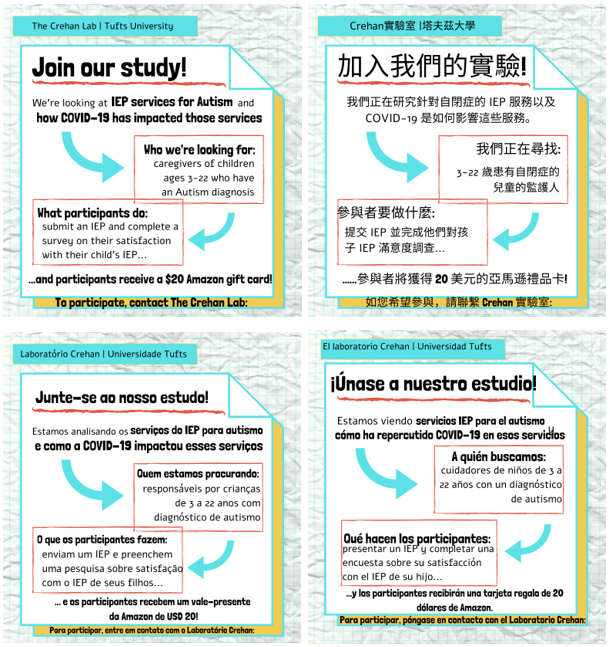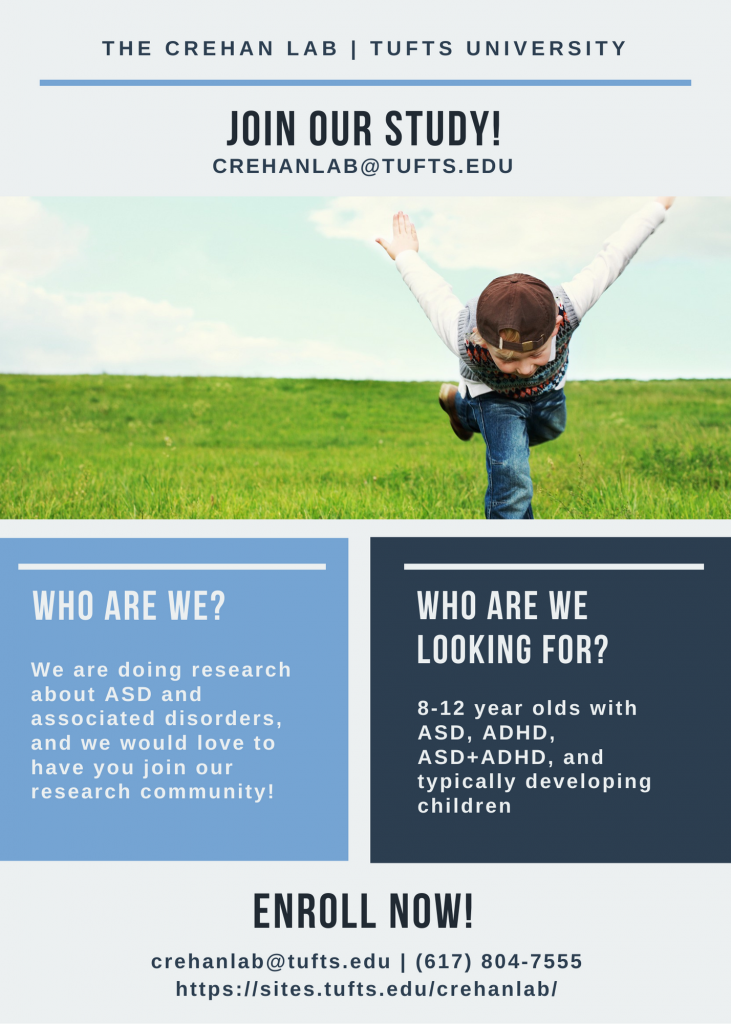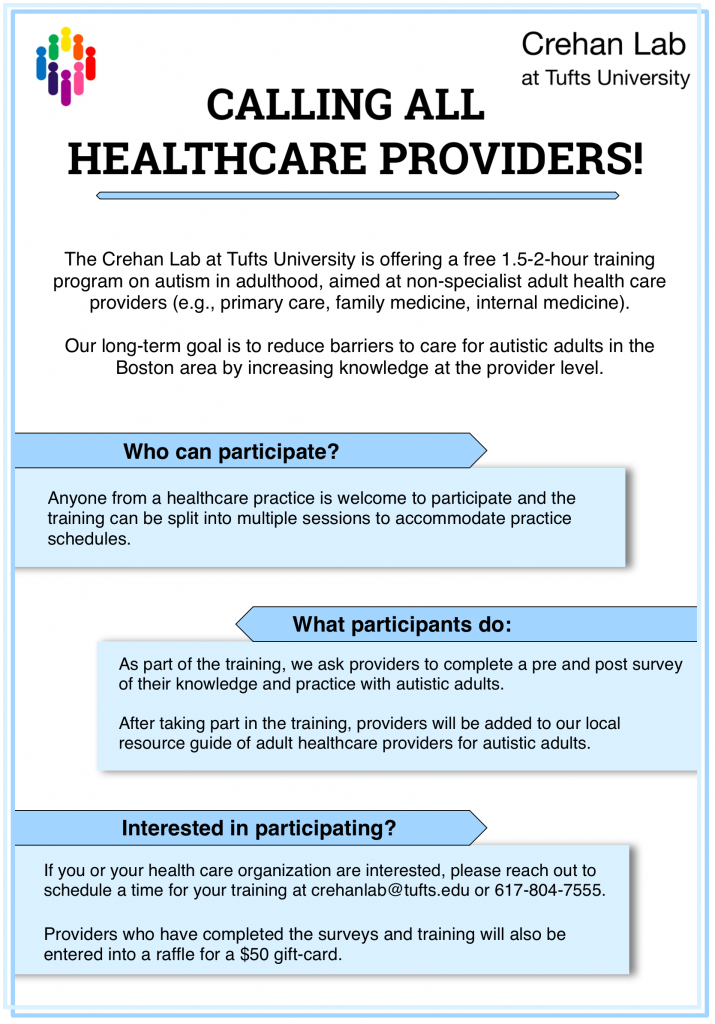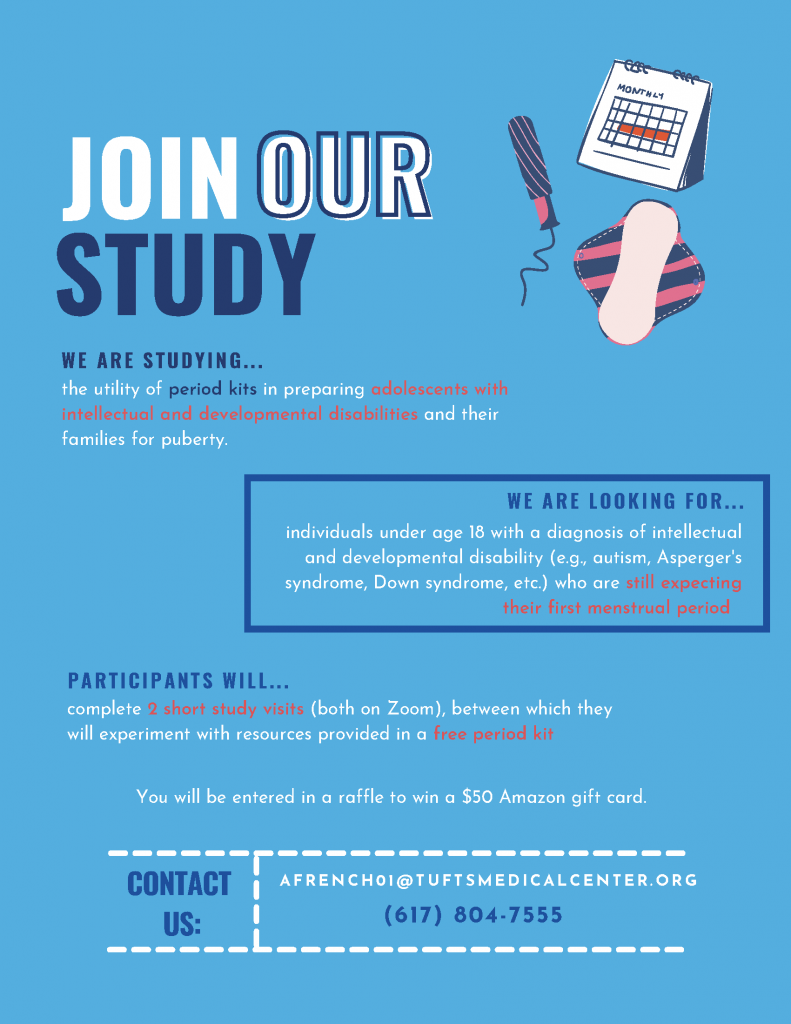If you are interested in participating in any of our current studies, please reach out to us at crehanlab@tufts.edu.

IEP Project
Looking for: Caregivers of children ages 3-22 who have an autism diagnosis
What you would do: Submit an IEP and complete surveys on satisfaction with your child’s IEP.
Purpose of this study: Our research seeks to understand the nature of educational inequity for students with ASD by exploring the impact of developmental category, symptom severity, race, culture, ethnicity, and socioeconomic status on the special education services provided to students ages 3-21. The study is available in English, Spanish, Portuguese, and Chinese (Cantonese/Traditional characters).
Click here for the study in English!
¡Clique aqui para el estudio en español!

Looking Study (Eye Tracking)
Looking for: Children ages 8-12 with a diagnosis of autism, ADHD, autism and ADHD, or without a diagnosis of either, plus one parent/caregiver.
What you would do: Attend a one-time study visit at the lab for about 60-90 minutes. During this visit, the child will view a series of images and videos on a computer while their eye movements are tracked using an eye tracking camera. They will also wear an “Empactica” bracelet on their wrist to track heart rate. They may also complete a brief IQ screener. The parent/caregiver will bring a copy of a recent assessment for the research team and complete some questionnaires. Families will be paid $20 for their time.
The purpose of the study: We are exploring how eye movements can provide important information to distinguish between autism and ADHD, which can be challenging clinically.

KISS Project (Eye Tracking)
Looking for: Adults between the age of 18-35 with or without an ASD diagnosis who are able to understand study procedures, risks and benefits, and assessments that are presented in English.
What you would do: Complete a screening call and 3 visits within a 6-month period. At the first visit, your thinking skills, language ability, and current behaviors related to ASD will be observed by us to confirm eligibility. We will provide you with standardized cognitive tests and ASD diagnostic observations. A second and third visit will be the same and happen 3 months apart. You will complete some surveys and participate in computer assessments of social skills using an eye-tracking device with a bracelet to test your heart rate. After each visit, you will be paid $50 for your time.
Purpose of our study: The Key Intimate Social Skills (KISS) project is supported by the National Institutes of Health (NIH). We aim to develop and validate a new set of instruments to measure the advanced social skills required for safe and healthy romantic and sexual functioning of adults with ASD. The results will also help us determine whether the lab-based social skills tasks are related to other social skills, sexual health, and successful dating.

Gender Study
Looking for: Children ages 8-12 with a formal Autism Spectrum Disorder (ASD) diagnosis and their parent/caregiver.
What would you do: Participate in an interview about gender identity, complete a short gender conceptualization task, and complete a couple of demographic and identity surveys. In total participating in this study should take about ~75-90 minutes.
Purpose of this study: Our study aims to understand how autistic children ages 8-12 conceptualize gender identity. Little is known about the development and conceptualization of gender in autistic children, and as understanding and developing gender are key developmental tasks, this will be the first known attempt to better understand these processes for autistic children.

Access to Adult Healthcare
Looking for: Healthcare providers in primary care and/or OB-GYN care
What you would do: Attend a 1.5-2hr training program on autism in adulthood (can be split into multiple sessions, available in-person or on Zoom) and complete a pre-and post-survey
The purpose of the study: Our long-term goal is to reduce barriers to care for autistic adults in the Boston area by increasing knowledge at the provider level.

Pediatric Screener Tool
Who we are looking for: Children (8-13 y/o) with an autism diagnosis AND their parent/caregiver.
What you will do: Participate in a 45-minute study at Tufts or at your location of choice. Your child will test out an iPad activity, and you will answer a brief questionnaire.
The purpose of the study: Through this study, we intend to assess the utility of a gamified screener as a means of assessing the sexual and relationship education (SRE) held by autistic children. The screener will indicate where the child needs supplemental education, and these results will map on to sexual health resources that will be sent to the child’s family. The data collected from the screener prototype and the caregiver questionnaire will allow us to determine how autistic children’s SRE can be supplemented in an informative and accessible manner within the current healthcare system.

On Pause: Focus Groups and Individual Interviews for Spanish-Speaking Families: Increasing Sex Education Accessibility for Autistic Adolescents
Looking for: Adolescents (ages 11-18) with a diagnosis of ASD and their parent/caregiver whose primary language is Spanish
What you would do: Discuss experiences and barriers for adolescents with ASD through one-on-one interviews and small focus group sessions
Purpose of this study: Our study, “Focus Groups and Individual Interviews for Spanish-Speaking Families: Increasing Sex Education Accessibility for Autistic Adolescents”, aims to incorporate culture-specific perspectives into sexuality and relationship education, so that we may know how to adapt this programming in a way that is more accessible and useful for Spanish-speaking families. With your help, we hope to determine how to best approach these barriers and address them in the future.

Electronic Device Accessibility Study
Looking for: adults 18+ with physical disabilities and their primary caretakers with experience using accessible electronic devices
What you would do: Complete a 45 min-1 hour interview to speak about your experiences and barriers using an electronic device. Participants will be paid $20 for their time.
Purpose of this study: We would like to hear from people with physical disabilities and their caretakers about their experience using electronic devices to assist them. The interviews will inform the creation of resources that will be distributed to healthcare providers with the goal of improving access and knowledge about accessible electronic devices.
Partnership Studies

